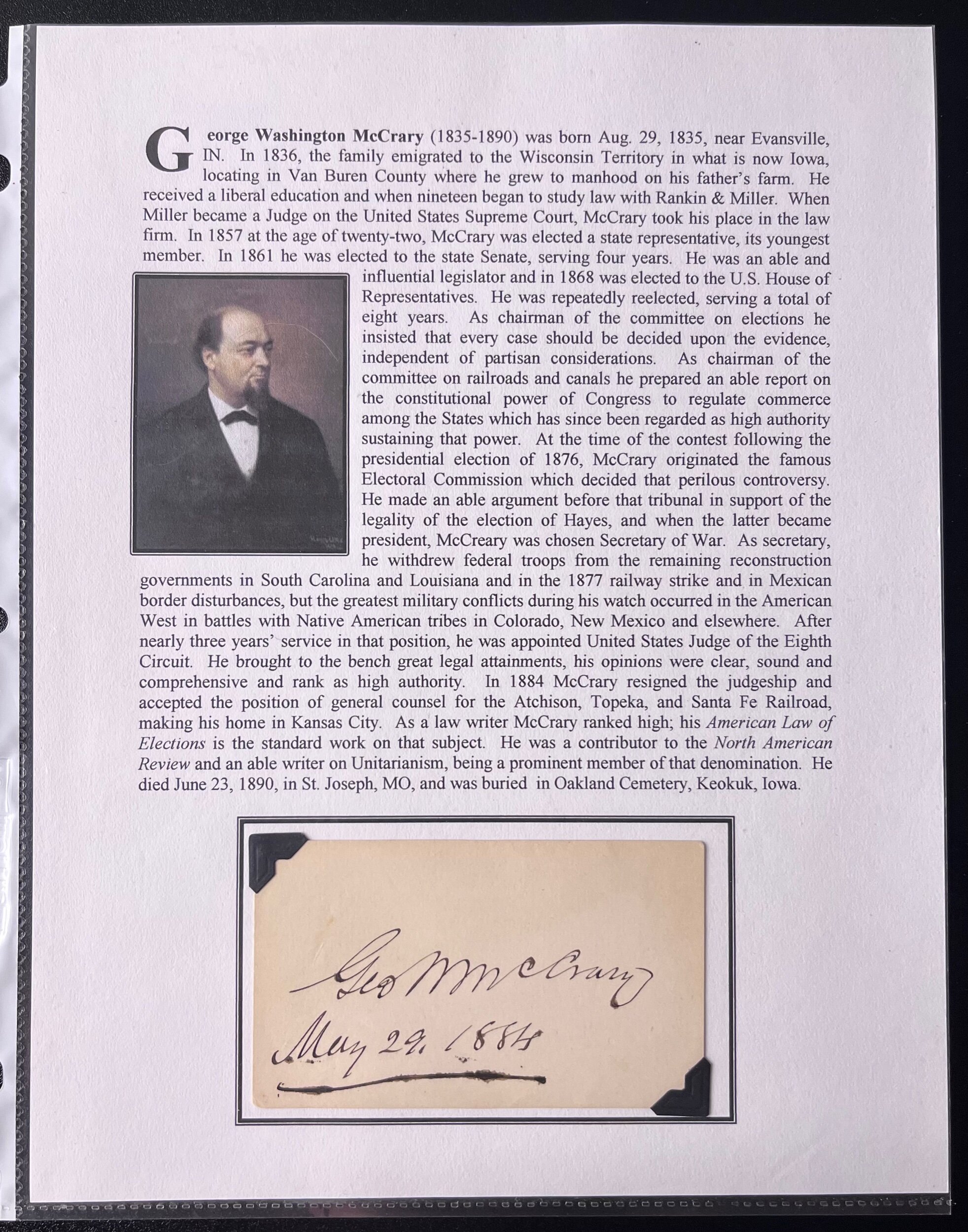
George Washington McCrary Signature
This is a signature from George Washington McCrary, (1835-1890) was born August 29th, 1835 near Evansville, IN. In 1836, the family emigrated to the Wisconsin Territory in what is now Iowa, locating in Van Buren County where he grew to manhood on his father's farm. He received a liberal education and when nineteen began to study law with Rankin & Miller. When Miller became a Judge on the United States Supreme Court, McCrary took his place in the law firm. In 1857 at the age of twenty-two, McCrary was elected a state representative, its youngest member. In 1861 he was elected to the state Senate, serving four years. He was an able and influential legislator and in 1868 was elected to the U.S. House of Representatives.
He was repeatedly reelected, serving a total of eight years. As chairman of the committee on elections he insisted that every case should be decided upon the evidence, independent of partisan considerations. As chairman of the committee on railroads and canals he prepared an able report on the constitutional power of Congress to regulate commerce among the States which has since been regarded as high authority sustaining that power. At the time of the contest following the presidential election of 1876, McCrary originated the famous Electoral Commission which decided that perilous controversy.
He made an able argument before that tribunal in support of the legality of the election of Hayes, and when the latter became president, McCreary was chosen Secretary of War. As secretary, he withdrew federal troops from the remaining reconstruction governments in South Carolina and Louisiana and in the 1877 railway strike and in Mexican border disturbances, but the greatest military conflicts during his watch occurred in the American West in battles with Native American tribes in Colorado, New Mexico and elsewhere.
After nearly three years' service in that position, he was appointed United States Judge of the Eighth Circuit. He brought to the bench great legal attainments, his opinions were clear, sound and comprehensive and rank as high authority. In 1884 McCrary resigned the judgeship and accepted the position of general counsel for the Atchison, Topeka, and Santa Fe Railroad, making his home in Kansas City. As a law writer McCrary ranked high; his American Law of Elections is the standard work on that subject. He was a contributor to the North American Review and an able writer on Unitarianism, being a prominent member of that denomination. He died June 23, 1890, in St. Joseph, MO, and was buried in Oakland Cemetery, Keokuk, Iowa.
This is a signature from George Washington McCrary, (1835-1890) was born August 29th, 1835 near Evansville, IN. In 1836, the family emigrated to the Wisconsin Territory in what is now Iowa, locating in Van Buren County where he grew to manhood on his father's farm. He received a liberal education and when nineteen began to study law with Rankin & Miller. When Miller became a Judge on the United States Supreme Court, McCrary took his place in the law firm. In 1857 at the age of twenty-two, McCrary was elected a state representative, its youngest member. In 1861 he was elected to the state Senate, serving four years. He was an able and influential legislator and in 1868 was elected to the U.S. House of Representatives.
He was repeatedly reelected, serving a total of eight years. As chairman of the committee on elections he insisted that every case should be decided upon the evidence, independent of partisan considerations. As chairman of the committee on railroads and canals he prepared an able report on the constitutional power of Congress to regulate commerce among the States which has since been regarded as high authority sustaining that power. At the time of the contest following the presidential election of 1876, McCrary originated the famous Electoral Commission which decided that perilous controversy.
He made an able argument before that tribunal in support of the legality of the election of Hayes, and when the latter became president, McCreary was chosen Secretary of War. As secretary, he withdrew federal troops from the remaining reconstruction governments in South Carolina and Louisiana and in the 1877 railway strike and in Mexican border disturbances, but the greatest military conflicts during his watch occurred in the American West in battles with Native American tribes in Colorado, New Mexico and elsewhere.
After nearly three years' service in that position, he was appointed United States Judge of the Eighth Circuit. He brought to the bench great legal attainments, his opinions were clear, sound and comprehensive and rank as high authority. In 1884 McCrary resigned the judgeship and accepted the position of general counsel for the Atchison, Topeka, and Santa Fe Railroad, making his home in Kansas City. As a law writer McCrary ranked high; his American Law of Elections is the standard work on that subject. He was a contributor to the North American Review and an able writer on Unitarianism, being a prominent member of that denomination. He died June 23, 1890, in St. Joseph, MO, and was buried in Oakland Cemetery, Keokuk, Iowa.